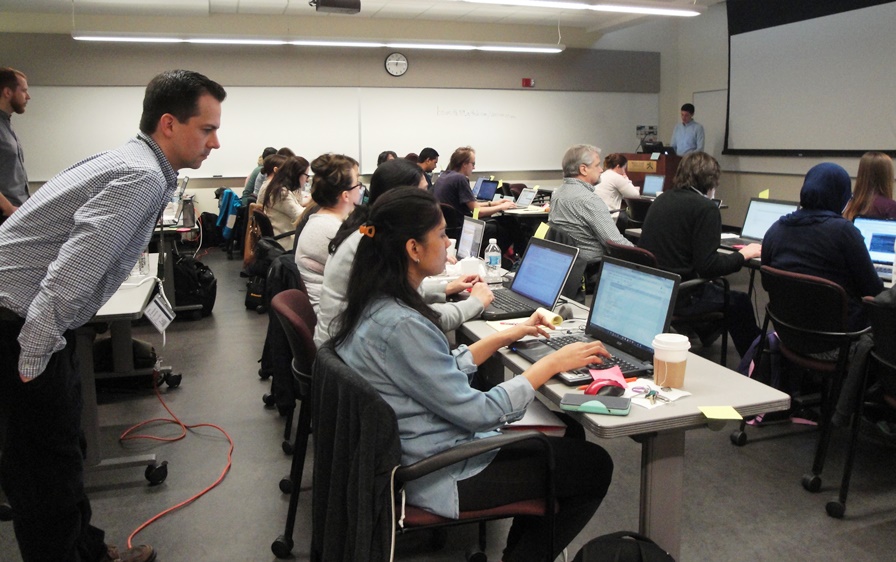
About 30 graduate students, research staff, postdoctoral fellows and faculty from the Wayne State University School of Medicine and the College of Liberal Arts and Sciences spent April 27-28 learning the basics of programming in the Computation in Biology Outreach and Research Group's "Software Carpentry" workshop held in the medical school's Mazurek Medical Education Commons.
Participants learned command line operations and version control, and were introduced to Python, a widely-used high-level programming language that emphasizes code readability. The workshop was taught by the University of Michigan's Byron Smith, M.S., and Chris Gates, M.S.
"I didn't know anything about Python," said workshop attendee Ben Kuiper, a fourth-year doctoral student working in the laboratory of Professor Ladislau Kovari, Ph.D.
"Our lab does some computational work called molecular dynamics. Learning some of this language, we think, can help us with some of those molecular dynamics' simulations. It may allow us to keep up with state-of-the-art techniques that are out there," Kuiper said. "The trick will be how to apply these basics to what we're doing. They are good skills to learn."
CiBORG is a product of the School of Medicine's Department of Microbiology, Immunology and Biochemistry, in conjunction with the WSU Broadening Experiences in Scientific Training, or BEST, program. CiBORG is supported by a grant from BEST. Workshop attendees were from the program's home department, as well as the Center for Molecular Medicine and Genetics, the Department of Surgery, the Cancer Biology Graduate Program and Barbara Ann Karmanos Cancer Institute, and the Department of Biological Sciences at the College of Liberal Arts and Sciences.
"Getting the fundamentals down is the point of this workshop. It has been fantastic. A lot of people are already seeing ways to apply what they have learned to their research," said William Close, a fifth-year doctoral student in the department who also organizes CiBORG's regular seminars.
Close, postdoctoral research associate Andrew Winters and Assistant Professor of Microbiology, Immunology and Biochemistry Kevin Theis, Ph.D., are co-principal investigators on the BEST grant. The mission of CiBORG is to facilitate the discussion and effective implementation of computational and analytical techniques among biomedical researchers in the School of Medicine and the university.
"The whole point is to have an open source community of specialists, and spread that knowledge to as many people as possible," Close said.
That includes promoting a culture of self-sustainability by certifying those who attend the workshops as instructors later. As WSU laboratories implement new computational tools in their research, CiBORG asks that they share the process, including tips, caveats and hands-on proof-of-concept demonstrations.
A "Data Carpentry" workshop will be held at a date to be determined, likely in June, and will complement the software workshop.
Upcoming seminars:
May 4: Implementation of bioinformatics in core facilities and industry, featuring Chris Gates, M.S., lead software engineer for the Bioinformatics Core at the University of Michigan.
May 11: Modeling evolution using artificial intelligence and machine learning, featuring Chris Adami, Ph.D., Michigan State University.
May 18: Database management and software development in a health care setting, featuring Carlos Anderson, Ph.D., senior software developer for the University of Michigan Health.
All seminars begin at 1 p.m. Thursday in Scott Hall's Room 7364.
For additional information, contact Dr. Theis at ktheis@med.wayne.edu.